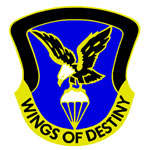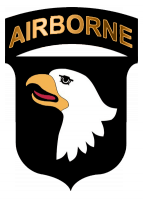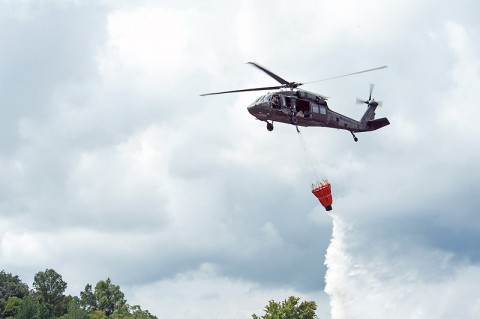Written by Sgt. Duncan Brennan
101st Combat Aviation Brigade


Fort Campbell, KY – CH-47 Chinook helicopter aircrews from B Company, 6th Battalion, 101st Combat Aviation Brigade, 101st Airborne Division (Air Assault,) began training for severe weather and wildfire missions at Fort Campbell, KY, August 15th, 2013.
If there is a severe-weather emergency, B Company 6-101st CAB, the Pachyderms, will transport supplies, personnel and conduct rescue missions. In the event of a wildfire, the Pachyderms would douse hotspots to redirect or stop an advancing fire.

“We deal primarily with spot fires,” said Chief Warrant Officer 2 William Haynes, B 6-101st CAB CH-47 instructor pilot. “You won’t see us flying into the middle of a 6000 acre fire. We’ll be taking care of hot spots around the edge of the fire helping to contain the fire and redirect it away from certain areas. Two-thousand gallons of water is plenty to keep a small area wet and keep it from burning.”
For some, this was the first time training for a mission in a non-combat environment.
“I was at Fort Bragg, NC for five years as a pilot and this is actually my first time doing this,” said Haynes. “This is not new for cargo helicopters, but it’s new to me.”
For the aircrews with the Pachyderms, this is a unique opportunity to translate their experience sling loading cargo in the mountains of Afghanistan into assisting within the community. Having a mission on the home front brings a measure of satisfaction to B Company.
“It’s one thing to help out your brothers and sisters on the ground,” said Sgt. Justin Rose, B 6-101st CAB CH-47 flight engineer. “It’s a little different when you’ve got innocent people out there just weathering the storm. It’s a great feeling to be able to help here at home, I hope they never need us, but we’re here if they do.”
At the end of the day, being able to see how their mission is rewarding for the Pachyderms. Being able to touch someone’s life in a positive way lends additional purpose to the aircrews.
“You can see the results directly,” said Haynes. “There’s an immediate gratification of that. I can spend 12 hours sweating everything that I have and I can show I’ve accomplished something and people are happy that we were there to help.”







